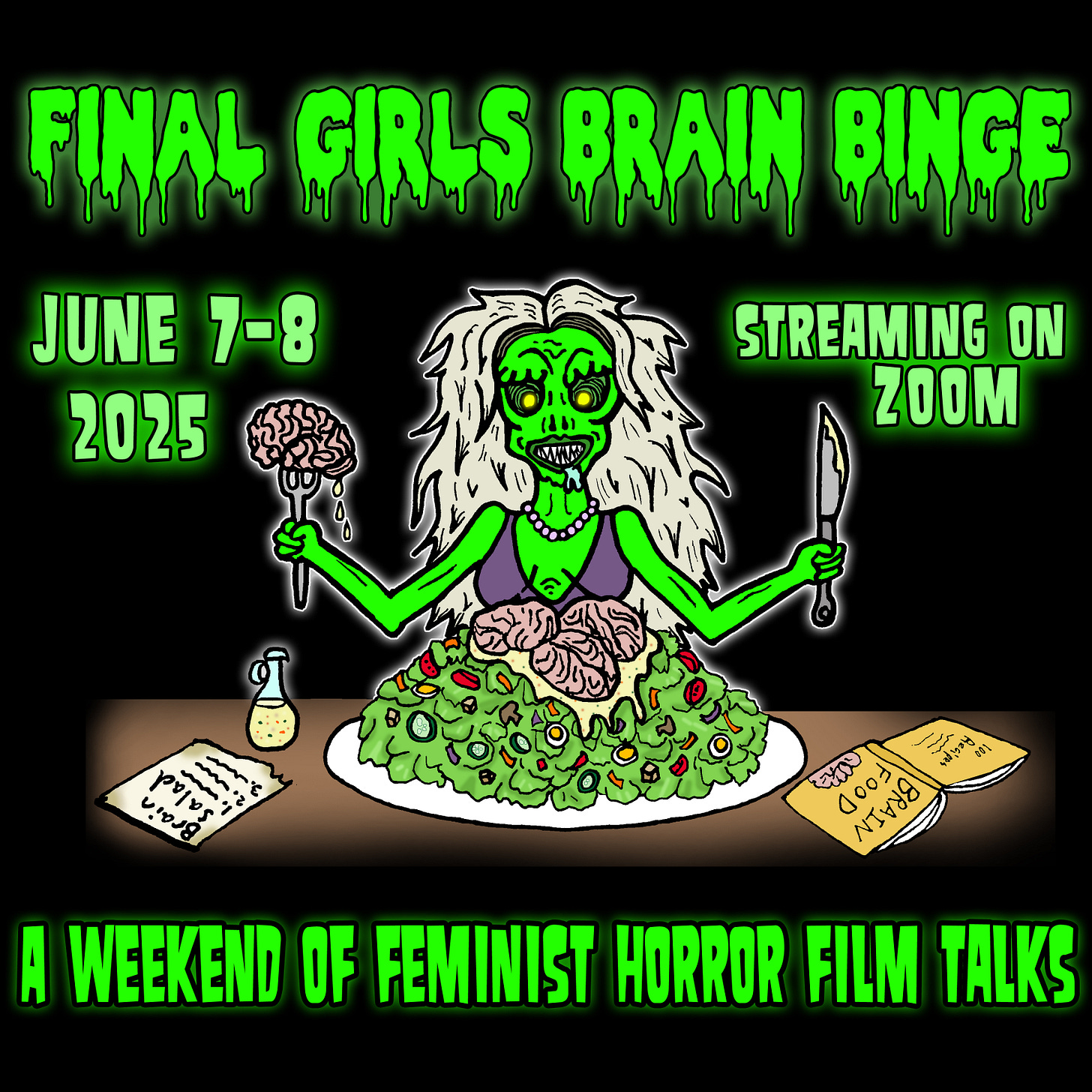The time has come, Brain Binge begins tomorrow at 14:00 Berlin time! Get ready for 8 talks by brilliant horror experts that’ll enrich, enthrall, and enliven!
Just a few things to keep in mind: please make sure your sound and video is turned off when you enter the zoom call. You’ll be able to ask your questions after each talk - either write them in the chat or turn on your video and ask them yourselves in the Q&A portion of the event. If you would like captions, you can turn on the captions button on the bottom right of the zoom screen. If you have any questions, we’re here to answer them!

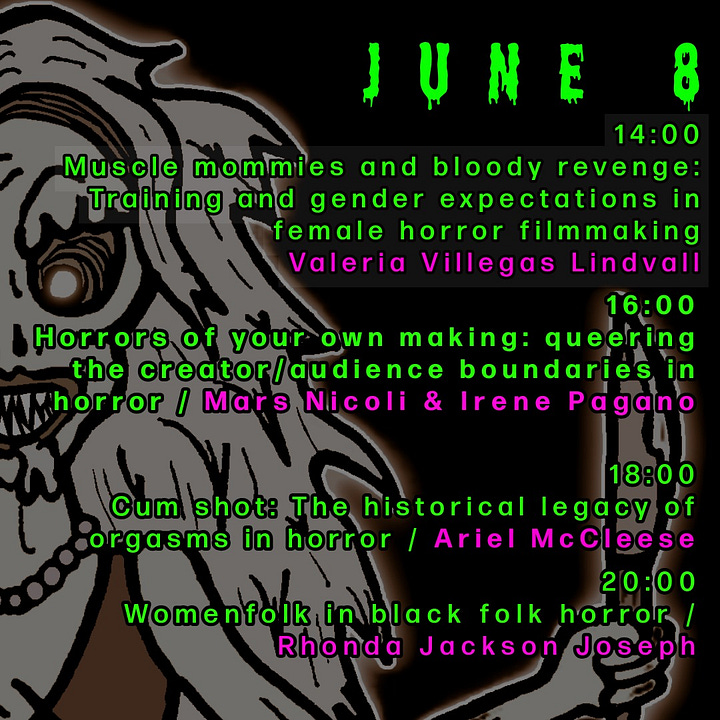
June 7
14:00 CET / The Absent, Omnipresent Women of Hitchcock / Rebecca McCallum
From the enigmatic Rebecca de Winter, to the ethereal Madeline Elster and the ultimate Hitchcockian matriarch Norma Bates, these women are denied a voice and their stories are told by others. However, their power and influence continue to loom unforgettably and unignorably over the films and in the minds of viewers. This presentation will examine the absent -and yet conversely- pervasive women who are placed at the centre of Rebecca (1940), Vertigo (1958) and Psycho (1960) as the absent figure who continues to return. Using the idea of the absent but very ‘present’ woman as a means of exploring feminism and misogyny at play in the films, as well as how Hitchcock communicates ideas of female power visually through composition and the spaces, this talk will also share theories on modes of obsession, identification, assimilation and division and what all this might reveal about Hitchcock himself.
16:00 CET / Feminism and Female Filmmakers in Folk Horror / Laura Cannon
Feminism and Female Filmmakers in Folk Horror explores the evolution of the Folk Horror genre through a feminist lens, focusing on the emerging role of women behind the camera and the shifting representation of female characters within these stories. While the term “Folk Horror” only gained traction in the 2010s, its roots can be traced back to early cinema. Traditionally, these films often portrayed female characters as antagonists—figures resisting modernity and embracing paganism. Although male characters typically prevailed in these narratives, recent works have subverted that dynamic, highlighting the consequences of male rationalism and the dismissal of women’s warnings. These modern stories frame men as "realist sons" who ignore the cautionary voices of "superstitious daughters," ultimately leading to their downfall. This presentation examines how female filmmakers are redefining the genre and reclaiming its folkloric and feminist potential.
18:00 CET / Gentrification Horror / Rachel Kerry & Diana Denza
As a genre, horror has a long and rich history of cultural commentary. At a time when many urban spaces are impacted by intensifying gentrification, horror has met the moment by critiquing this phenomenon and exposing the inequities inherent in it. Led by an academic and a horror filmmaker, this joint presentation will explore definitions of gentrification and its effects on urban communities, philosophical conceptions around the importance of horror, and social commentary in horror cinema. We'll also share a working definition of gentrification horror and outline the techniques used within this growing subgenre. Throughout our presentation, we will pay special attention to the work of those who have been traditionally marginalized in academia and art, including women and people of color. Join us as we do a deep dive into the groundbreaking subgenre of gentrification horror.
20:00 CET / Queerness & Disability in Horror Panel / Heather Petrocelli, Carrow Narby, Rabia Sitabi, Ariel Baska
In this panel, Heather Petrocelli moderates a wide-ranging and amorphous conversation about the ways that Queerness, Disability and Horror intersect, using films such as Society, Bulbbul, and Blade II. The fluidity and dynamism of the spectrums we all exist on face existential threats every day that horror mirrors beautifully. The panel of filmmakers, authors, and curators will share how their work responds to and informs new understanding of identities on the edge.
June 8
14:00 CET / Muscle Mommies and Bloody Revenge: Training and Gender Expectations in Female Horror Filmmaking / Valeria Villegas Lindvall
Let’s get physical. Over the past few years, visual culture has embraced ––not without its problematic objectifications–– women’s fitness, popularized with the internet figure of the ‘muscle mommy.’ Recent films like Love Lies Bleeding, Rose Glass’ lesbian outlaw thriller and The Substance, Coralie Fargeat’s sharp critique, underline the importance of a conversation on bodily autonomy that stretches the boundaries of expectation from a female and feminist perspective. This talk explores the importance of training as an arena to negotiate expectations on feminized bodies and eroticism, subverting gendered practices as body building or blasting the ridiculousness of visual culture to deliver belligerent messages of revenge on patriarchal control.
16:00 CET / Horrors of Your Own Making: Queering the Creator/Audience Boundaries in Horror / Mars Nicoli & Irene Pagano
This talk will provide an overview of the current state of grassroots, online horror storytelling, followed by a workshop guiding the audience in making their own “choose your own adventure”-style short story. Mars will introduce part of his research on trans horror authorship, presenting the results of a qualitative study with trans horror podcast writers and directors, focusing on both practical and artistic reasons for choosing podcasting as an alternative form of storytelling. Irene will address how indie horror games allow marginalised creators to engage in personal and political art-making within a large community of users, inspiring players to reflect, take action and tell their own stories. Both contributions will delve into the potential of digital storytelling as a tool to disrupt the boundaries between artist and audience: here the horror often relies on the unseen or unspoken, intentional glitches or silences which call the audience to fill the void with horrors of their own making. We will then respond to that call by inviting the talk’s audience to take power over their narrative, by relying on the free digital storytelling tool Twine to collectively write a hyperlink story around themes of gender, monstrosity and marginalization.
18:00 CET / CUM SHOT: THE HISTORICAL LEGACY OF ORGASMS IN HORROR / Ariel McCleese
One of the most deeply entrenched tropes in the horror genre is the punishment of female, trans, and non-binary pleasure. If you’ve seen a slasher movie, you know the rule: she who fucks first, dies first. In horror you’ll see a woman orgasm, but the only thing she squirts is blood. Following Carol Clover’s 1992 Men, Women, and Chainsaws, a critical understanding of the Final Girl entered the collective lexicon. Suddenly, horror fans became aware of the unwritten rule of horror: virgins survive, sluts die. With the rise of feminist horror films, a reexamination of female and gender-expansive pleasure is necessary. In Jennifer’s Body (2009), female sexual pleasure rises above the subtextual, but still denotes monstrosity. In Raw (2016), Justine’s sexuality is layered and complex, refreshingly relatable; but Justine’s orgasm still necessitates self-inflicted punishment, a blood sacrifice. It is in queer horror where the transformative potential of pleasure has truly been reclaimed. In Knife+Heart (2018), queer violence metamorphoses into queer beauty. Huesera (2022) finds liberation between the sheets of lesbian lovemaking. In Titane (2021), trans pleasure is reborn, shiny and chrome. This lecture will trace the legacy of pleasure in horror cinema, and envision what’s to cum.
20:00 CET / Womenfolk in Black Folk Horror / Rhonda Jackson Joseph
In this presentation, Rhonda Jackson Joseph will provide a framework for defining Black folk horror in the context of larger folk horror parameters. Specifically, she posits that while firmly entrenched in the basic tenets of folk horror (presence of folklore, isolated landscapes, skewed community morals/collective beliefs, and sacrifice), Black folk horror also includes other aspects borne from Black experiences: the offer of redemption, the presence of a witness to carry the legend forward, and victims to display the effects of the horror. This last tenet presents the idea of Black folklore also including any folk horror with Black characters whose experiences are personalized through their Blackness. She will analyze the characterization of select female characters from Black folk horror movies through this lens: Anne-Marie McCoy from Candyman (1992), Brianna Cartwright from Candyman (2021), Dr. Cushing from Tales from the Hood (1995), Georgina from Get Out (2017), Lenora Chrichlow from the Horror Noire episode “Bride before You” (2021), and Emerald Haywood from Nope (2022).
Brain Binge is free and on zoom, but if you’d like to support us you can always donate here:
FGBFF EVENTS
June 7 & 8, 2025 - Brain Binge 2025, zoom
August 1, 2025 - “Beauty is Pain” Short Film Curation at Freilichtbühne Weißensee, Berlin
...and more to come!
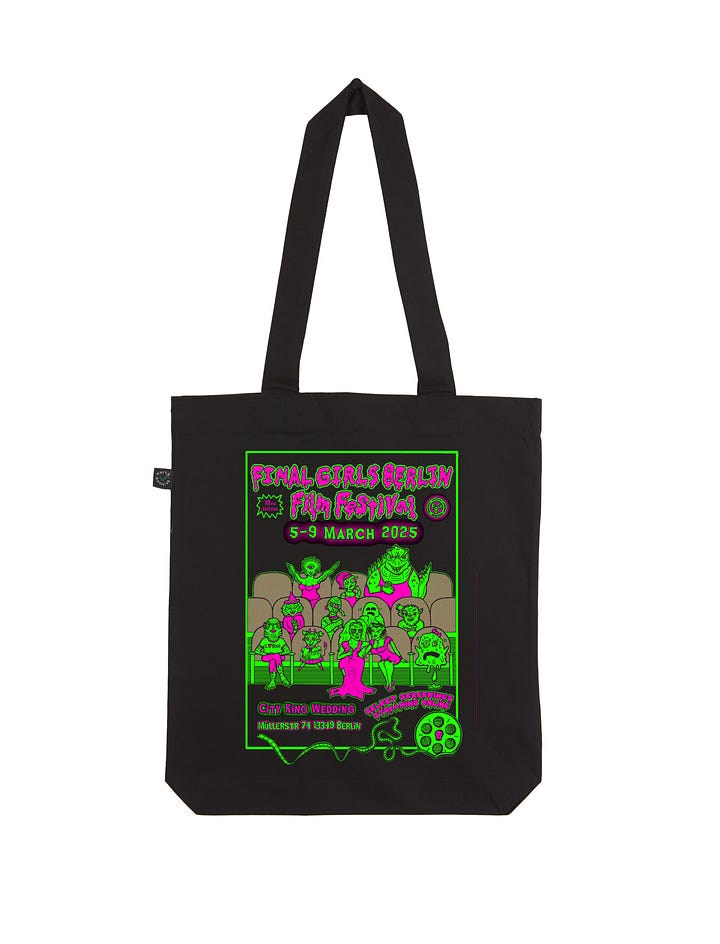
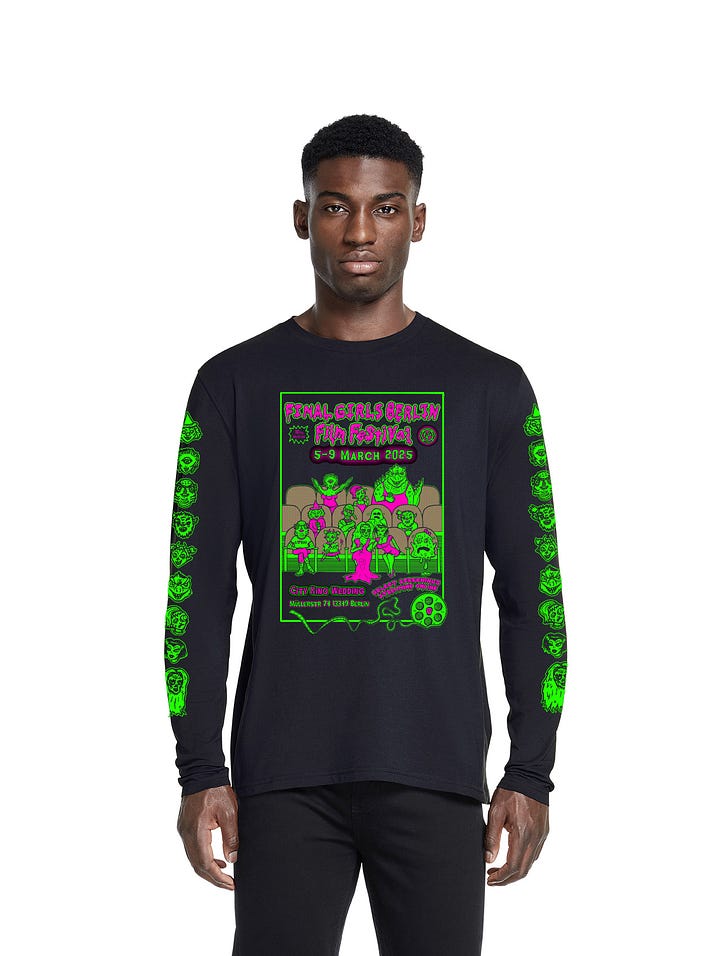
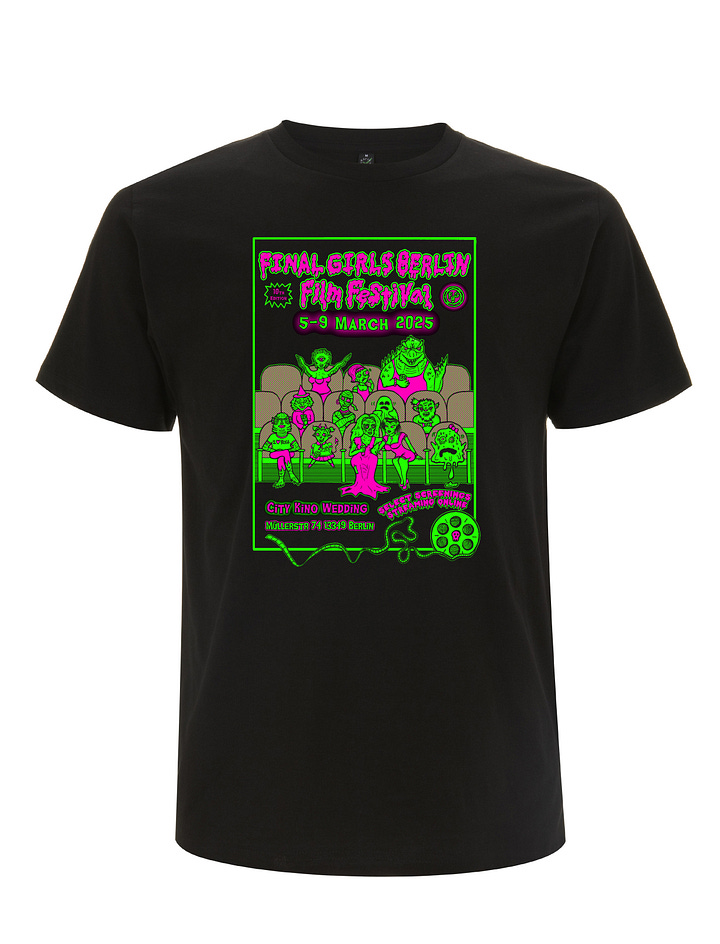

Available at our online shop and we do ship internationally!
Did you know we have a Patreon?
For just 2€ a month you can watch a wide selection of our film highlights





